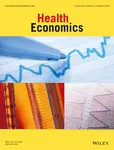Nonlinear price schedules generally have heterogeneous effects on health-care demand. We develop and apply a finite mixture bivariate probit model to analyze whether there are heterogeneous reactions to the introduction of a nonlinear price schedule in the German statutory health insurance system. In administrative insurance claims data from the largest German health insurance plan, we find that some individuals strongly react to the new price schedule while a second group of individuals does not react. Post-estimation analyses reveal that the group of the individuals who do not react to the reform includes the relatively sick. These results are in line with forward-looking behavior: Individuals who are already sick expect that they will hit the kink in the price schedule and thus are less sensitive to the co-payment.
Paper: https://doi.org/10.1002/hec.3395
Altmetric: https://www.altmetric.com/details/10348708
